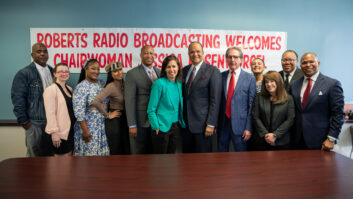Jessica Rosenworcel laid down a marker that she plans to resist FCC policy changes that could allow more media consolidation.
In her first remarks since returning to the Federal Communications Commission, Rosenworcel, one of the two Democrats on the five-member panel, spoke to the U.S. Conference of Catholic Bishops Thursday.
Noting the recent mass shooting in Las Vegas and how it was covered by media, she asked: “How do we advance journalism when algorithms are ascendant? How do we advance trust in real facts instead of dismissing them as fake news? This is hard. I don’t have all the answers. But I do know this: The solution doesn’t come with the commission scrapping its policies to prevent media concentration.”
She said limits on the number of broadcast stations that one company can own were “designed to help sustain media diversity, localism and competition. Those values may not be especially trendy, but I think they are solid. I think they play a critical role in advancing the mix of facts we all need to make decisions about our lives, our communities, and our country. I fear we are on the cusp of dismantling those values.”
Rosenworcel singled out the proposed merger of TV biggies Tribune and Sinclair and argued that there is resistance to it across the political spectrum.
“The bottom line is we are not going to remedy what ails our media with a rush of new consolidation. We are not going to fix our inability to ferret fact from fiction by doubling down on a single company owning ever more of our public airwaves.”
She also cautioned against what she called a rush to market for the TV standard ATSC 3.0, saying that although there’s “a lot to be excited about” with the standard, the commission hasn’t fully explored its consequences for consumers. “This new standard is not backwards-compatible with current television devices. In the near term, with the standard voluntary, the cost of implementing it will be added to consumer cable and satellite bills. In the longer term, it means everyone will need to buy a new television set. This is not a great boon for consumers, it’s a tax on every household with a television.”
Among other topics she also spoke in favor of net neutrality, which she said “preserves our right to communicate freely online.”
And Rosenworcel told the bishops that during her time away from the commission, “I had the sweet privilege of attending every school performance and every little league game. I had the opportunity to reacquaint myself with the world through my children’s eyes and experience as digital natives. It’s trite but true that a little distance provides perspective. Because in my time away, one thing became abundantly clear: The future belongs to the connected.”











